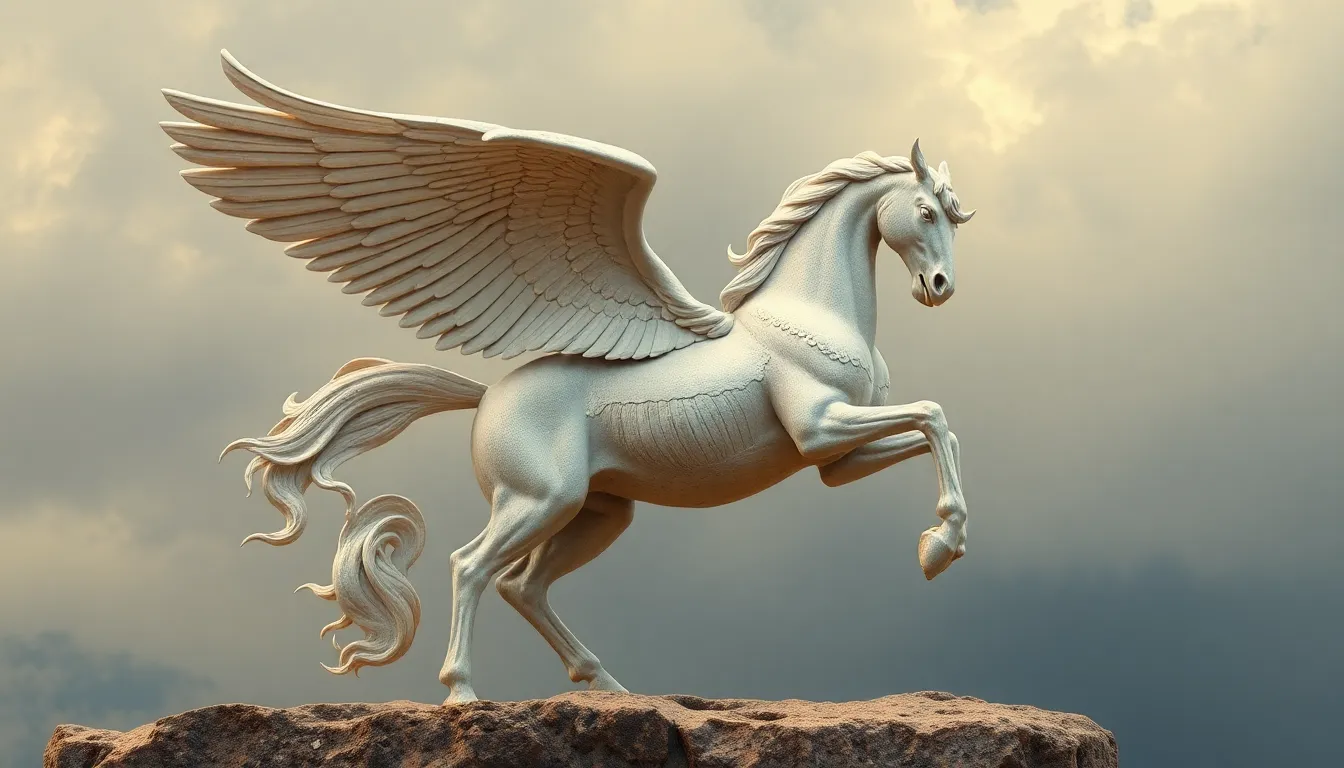The Role of Pegasus in Ancient Greek Philosophy
I. Introduction
In the rich tapestry of Greek mythology, Pegasus stands out as a symbol of beauty, grace, and inspiration. This winged horse, born from the blood of Medusa, has captivated the imaginations of countless generations. Beyond his mythological origins, Pegasus holds a significant place in Ancient Greek philosophy, embodying concepts of inspiration, the soul, knowledge, and the delicate balance between freedom and control. This article aims to explore the multifaceted role of Pegasus in philosophical thought, examining his legacy and relevance from ancient times to the present day.
II. Mythological Origins of Pegasus
The story of Pegasus begins with his extraordinary birth. According to myth, Pegasus sprang forth from the blood of Medusa when she was slain by the hero Perseus. He is often depicted as a magnificent white horse with wings, representing both the divine and the extraordinary.
Throughout Greek mythology, Pegasus is involved in several key narratives:
- Bellerophon and the Chimera: One of the most famous tales involves the hero Bellerophon, who tamed Pegasus with the help of a golden bridle given to him by Athena. Together, they battled the Chimera, a fearsome monster, showcasing the themes of heroism and the triumph of good over evil.
- The Quest for Glory: Bellerophon, riding Pegasus, sought to prove his worth and gain immortality. However, his hubris ultimately led to his downfall, demonstrating the dangers of overreaching ambition.
The symbolism of Pegasus in these narratives reflects the dual nature of aspiration—both the pursuit of greatness and the inherent risks involved.
III. Pegasus as a Symbol of Inspiration
Pegasus is often associated with artistic and poetic inspiration. The winged horse is said to have created the spring of Hippocrene on Mount Helicon, where the Muses, the goddesses of the arts, would gather. This connection emphasizes the role of Pegasus as a source of creativity and enlightenment.
- Connection to the Muses: Pegasus embodies the spirit of inspiration that fuels artistic endeavors. The Muses, who inspire poets, musicians, and artists, are closely linked to Pegasus, highlighting the importance of divine influence in the creative process.
Philosophically, Pegasus serves as a metaphor for the elusive nature of inspiration and creativity, prompting discussions about the sources of artistic expression and the role of the divine in human creativity.
IV. Pegasus and the Concept of the Soul
In philosophical contexts, Pegasus can be seen as an allegorical representation of the soul. His ability to soar through the skies symbolizes the transcendence of the spirit and the quest for enlightenment. This connection can be linked to Platonic ideas of the soul’s journey toward the divine.
- Platonic Ideas: Plato’s philosophy emphasizes the importance of the soul’s ascent to the realm of forms, where true knowledge and beauty reside. Pegasus, as a creature of the heavens, epitomizes this journey of the soul striving for higher truths.
- Metaphor for the Soul’s Journey: The imagery of Pegasus flying represents the soul’s aspirations and the pursuit of wisdom, encouraging individuals to seek enlightenment beyond the material world.
V. Pegasus in the Context of Knowledge and Wisdom
The pursuit of knowledge is a central theme in Greek philosophy, and Pegasus serves as a potent symbol of this quest. His flight represents the philosopher’s journey toward understanding and wisdom.
- Philosopher’s Quest: Pegasus embodies the ideal of seeking knowledge and truth, motivating philosophers to explore the depths of human existence and the cosmos.
- Notable Philosophers: Figures such as Plato and Aristotle discussed the nature of knowledge and the importance of intellectual pursuits, often using metaphors akin to the soaring nature of Pegasus to illustrate their ideas about enlightenment.
VI. The Duality of Pegasus: Freedom and Control
One of the most intriguing aspects of Pegasus is the tension between his untamed nature and the aspirations of humans. This duality raises philosophical questions about freedom and control.
- Untamed Nature: Pegasus represents the wild, unrestrained aspects of creativity and inspiration, which can lead to both flourishing and chaos.
- Human Ambition: The attempts to control Pegasus, as seen in the story of Bellerophon, reflect the struggle between human desires for order and the unpredictable nature of creativity.
Philosophically, this duality highlights the balance between chaos and order in human experience, encouraging reflection on the nature of freedom and the limitations imposed by societal norms.
VII. Legacy of Pegasus in Later Philosophical Thought
The influence of Pegasus extends beyond ancient Greece, impacting Renaissance and modern philosophy. The emblematic nature of Pegasus has inspired thinkers across centuries.
- Renaissance Influence: During the Renaissance, Pegasus became a symbol of artistic and intellectual rebirth, representing the merging of classical ideals with new humanistic perspectives.
- Contemporary Relevance: Today, Pegasus continues to be a relevant figure in discussions about creativity, inspiration, and the human condition, serving as a bridge between mythology and modern philosophical inquiry.
VIII. Conclusion
In summary, Pegasus occupies a unique and significant role in Ancient Greek philosophy, symbolizing inspiration, the soul’s journey, and the pursuit of knowledge. His dual nature reflects the complexities of human experience, embodying both the ideals of freedom and the constraints of control. The legacy of Pegasus persists through centuries, continuing to inspire philosophical thought and artistic expression.
As we reflect on the enduring significance of Pegasus, we recognize the profound ways in which mythology and philosophy intertwine, enriching our understanding of the human experience and the quest for meaning.




